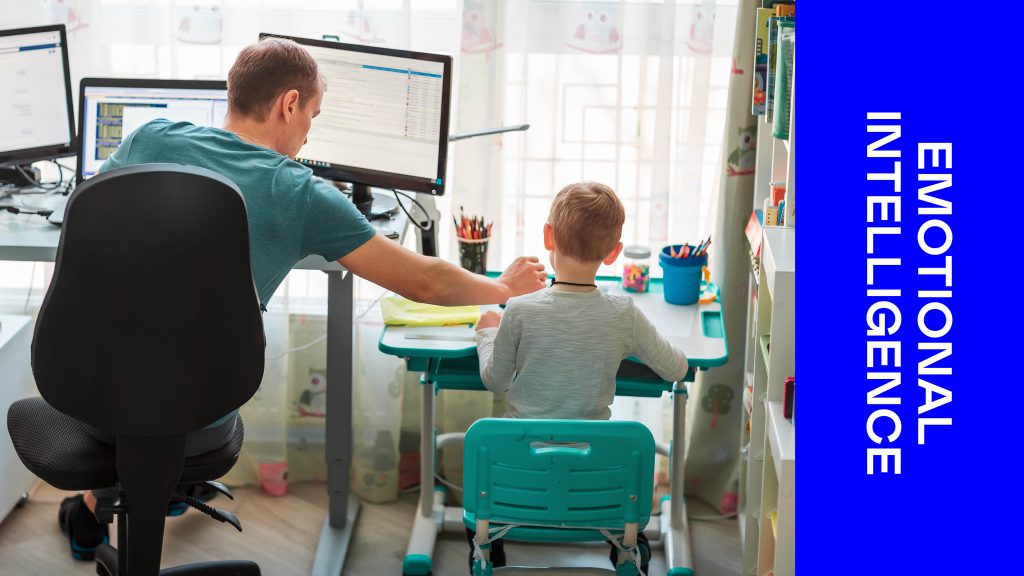Covid and the acceptance of technology-mediated forms of management have left the world with new challenges including the need and opportunity to manage remote teams and hybrid organisations effectively. Leaders who are in tune with their emotional intelligence and who focus on improving human relationships are better able to motivate and drive team performance in this physically disconnected work space.
Before the Covid pandemic, organisations had clear hierarchical structures with well-understood rules and policy procedures. It was the norm to go into the office with a public, professional face and be able to limit relationships with colleagues to the work sphere. But in the last 18 months, work from home directives have meant navigating new informal remote structures where the spheres of professional and private life are no longer distinct.
According to Nana von Bernuth, CEDEP Faculty, INSEAD Adjunct Professor and Business Coach, this unprecedented way of working has been a big challenge for a wide variety of leaders.
“Leaders have needed to develop two roles. One is the public face of the company, where you need to have charisma and status. The other is the private face, where you’re managing people dealing with multiple personal challenges who now require more emotional support than ever,” she explains.
“This second role requires leaders to create psychological safety and trust remotely, which is very challenging. And how do you do this? By developing emotional intelligence and applying it to the way you lead during these unprecedented times. It is now almost impossible to lead high performing teams remotely without being able to manage your own emotions and empathise with others.”
Emotional intelligence has always been important in leadership, but in the remote space, understanding the complexities of emotional connection online is essential to lead successfully.
So what is emotional intelligence?
Emotional intelligence or EQ is the capacity to recognise and manage your own emotions, and then recognise and respond effectively to the emotions of others.
“As a young professional, IQ is important to get your foot in the door. But to evolve from a good leader to a great leader, you need to develop your emotional intelligence. Emotional intelligence is about creating good human relationships by putting yourself in the shoes of other people, understanding their point of view and considering how they might respond to an emotionally charged situation,” Nana says.
Empathy is at the heart of being able to sense what other people are thinking and feeling to then understand their perspective. Empathy however is not the same as sympathy.
“You do not need to like the colleague who triggered your emotions, but you need to understand or appreciate there may be a specific context or reason why this person behaved the way they did. Listening with empathy can help avoid misunderstandings which occur even more frequently in remote or hybrid settings,” Nana says.
| Creating the human connection: a three-step process Step one: Understand your emotions. Take the time to look inside yourself and self-reflect. What am I feeling and why am I feeling this way? The more you are aware of your emotions, the easier it is for you to manage them and influence how you might respond to others. Step two: Manage your emotions. Rational and emotional information are processed together in our brains. Emotional triggers tend to hijack our rational responses, which cause us to focus and obsess about why we are distressed. For example, if someone has taken credit for your work, it can be hard not to focus on anything but this and completely lose any objectivity. To manage your emotions, you therefore need to identify and understand your emotional triggers. The goal of self-management is to then bring the brain back to mental clarity and concentration. Step three: Empathise with others: Once you recognise your own emotions and how to manage them, you need to understand who you are addressing. Try to understand why the other person did what they did or reacted a certain way. Put yourself in their shoes. Why are they reacting this way? What are they feeling and thinking? |
5 practical strategies to connect emotionally with your hybrid teams
Leading effectively remotely does not require learning new skills or investing in the latest technologies. Instead, it is about identifying how some of your previously acquired skills and behaviours, such as empathy, trust and constructive feedback, have gained relevance.
In short, it is more about honing your emotional intelligence rather than learning new skills or adopting new practices. The balance has just shifted and there are several practical strategies leaders can develop to better connect emotionally with hybrid teams.
1) Set the stage: create a safe emotional and psychological space
Unlike in face-to-face meetings, check-ins at the beginning of online meetings have become much more critical to engage emotionally. How are you? is no longer a token question. Instead, it is an opportunity to connect and actively listen to your team. Take a personal interest in people, do not interrupt, ask questions and move from telling to asking mode. Be fully present to be able to tune into non-verbal communication and observe how people react. Acknowledging and empathising with the human toll of the pandemic is essential, especially in one-on-one meetings, to create a safe emotional and psychological space for everyone to thrive.
2) Demonstrate vulnerability: walk the talk to develop trust
In short, you need to walk the talk and communicate that it is OK not to be OK every once in a while. We are so used to presenting strong work faces to our managers and leaders to demonstrate our ability to deliver. But if you admit to not having all the answers or making mistakes, then your team will feel more comfortable doing the same.
Trust is a by-product of predictability. If you want to be predictable, you need to reduce the uncertainty of your behaviour. You need to unveil things about yourself, about how you think and act. It is like a dance: you go a step to them, open up and explain why you do what you do and what is going on inside you, and they will make a step towards you.
3) Create a sense of belonging: focus on team cohesion
Working from home and being physically disconnected from our teams can lead to insecurity, anxiety and even loneliness. People can feel lost and question their abilities without the safety of a strong team. Creating a sense of belonging and demonstrating you care by being empathetic is crucial to unite and motivate your team. Take the time to acknowledge personal achievements and provide positive feedback where you can.
4) Strengthen your digital senses: preparation is key
Humans have five senses, but in the digital world, these are limited. We can sense how someone feels from body language or facial expressions when we talk face-to-face or are even just present in the same room. But when we are online, we have to be much more careful in communicating and conveying information. This means that preparation for meetings is much more important including what you want to say and how you are going to say it. This is particularly relevant during one-on-one feedback conversations where you need to anticipate how you think someone will react and why.
5) Cultivate your emotional curiosity: invest time and energy
During these unprecedented times of remote and now hybrid workplace models, leaders need to devote more time and energy to understanding what is really going on with the people they work with and invest now more than ever in connecting on a personal level. We are no longer able to assume how people are feeling and instead need to cultivate our emotional curiosity. In short, you cannot start to engage and inspire people from where you are. You have to start where they are.
The good news is that while IQ is stable over time, EQ or emotional intelligence can be improved with practice. At CEDEP, our Achieving Managerial Excellence (AME) programme helps leaders and managers develop a wide range of soft skills, including emotional intelligence, to help improve human relationships and motivate and drive team performance.
At CEDEP, Nana von Bernuth directs Achieving Managerial Excellence (AME), our flagship programme on soft-skills for business leadership. She also directs our invaluable and highly relevant Remote Leadership programme which explores new ways of working in the post Covid-19 era.

Find out more about Nana von Bernuth here.
And for more information about our AME and Remote Leadership programmes, please contact Muriel PAILLEUX at muriel.pailleux@cedep.fr
